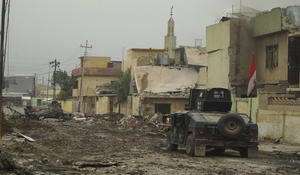Divided Society of Post-ISIS Mosul

“Divided Society of Post-ISIS Mosul“
Speaker: Mironova, V. (Harvard University)
Date: 7 October 2019
Speaker Session Preview
SMA hosted speaker session presented by Dr. Vera Mironova (Harvard University) as a part of its SMA CENTCOM Speaker Series. During her brief, Dr. Mironova presented the results of her December 2018-January 2019 survey of civilians and ISIS families in Mosul and its surrounding areas. Her research sought to answer the following questions: 1) What was ISIS?; 2) Why did people in Mosul support ISIS?; 3) Who is to blame for the crimes committed by ISIS?; 4) Who should be held accountable for their role in supporting ISIS?; and 5) Who deserves punishment for their support of ISIS, and what type(s) of punishment do they deserve? Dr. Mironova then highlighted some of her findings. There was a discrepancy between civilians’ (i.e., those victimized by ISIS) and ISIS families’ answers regarding whether ISIS was immediately welcomed when it moved into Mosul. Civilians and families did agree, however, that those who publicly supported ISIS in Mosul most commonly did so because they yearned for power and money. ISIS families also argued that some individuals may have joined ISIS to improve the economy, to improve law and order, to fight crime and corruption, and to fight immorality in society. Dr. Mironova also learned that both civilians and ISIS families blame ISIS leadership for the destruction in Mosul; however, citizens argued that fighters and foreign fighters should be largely held accountable as well, whereas ISIS fighters did not. ISIS families and civilians also had differing opinions with regards to the punishment that women in ISIS (wives and workers, low-level and high-level) should receive, though there was a general consensus among interviewees that ISIS was not a male-dominated group; women played significant roles as well. Lastly, Dr. Mironova spoke about her findings regarding democracy, rule of law, the application of the death penalty, and extrajudicial killings. Both civilians and ISIS families supported the death penalty for certain crimes and held similarly radical views in this respect; however, civilians expressed more of an interest in having ISIS leaders, local fighters, and foreign fighters all be put to death, whereas ISIS families expressed more interest in just having the leaders be put to death.
Comments